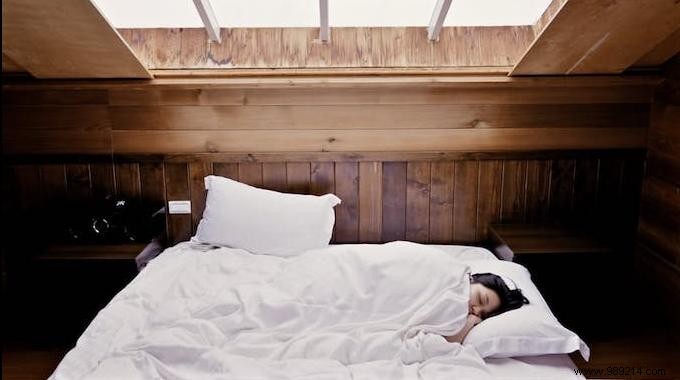
Have you ever thought about the room temperature where do you sleep?
Me, not really! I often have cold hands and feet.
So, I confess that I prefer to slip into sheets that are not frozen!
At the same time, sleeping in bed sheets that are too hot is not really the solution for me, because the excess heat wakes me up at night.
So, is there a middle ground to getting a good night's sleep? Is there an optimal temperature for better sleep?

According to scientific studies, the answer is yes !
The ideal temperature of a bedroom for optimal sleep is between 15 and 19°C.
It's not me saying it, but Dr. Christopher Winter, Medical Director of the Clinic of Neurology and Sleep Medicine in Charlottesville, USA.
In addition, temperatures above 24°C or below 12°C can disturb your sleep.

Body temperature naturally fluctuates, falling and rising throughout the day. It reaches its highest point in the early afternoon and its lowest point around 5 am.
When you fall asleep, your body naturally lowers its temperature. And it is precisely by helping your body to lower its temperature more quickly that you enjoy a restful sleep .
According to Dr Cameron Van Den Heuvel of the Center for Sleep Research at the University of South Australia:
“About 90 minutes before falling asleep, the core area of the body begins to drop in temperature, which intensifies the feeling of fatigue in adults. These physiological changes occur well before bedtime, sometimes without our realizing it. »
Sleeping cool has many daily health benefits. Here are 4 good reasons to sleep without heating tonight:
The explanation is as simple as pie. By putting your body in a more comfortable space to fall asleep, it does just that, and faster. On the other hand, if the temperature in your room is too high or too low, your body will waste energy trying to regulate body temperature. Result, you will spend the night tossing and turning in your bed.
When your body no longer expends energy to regulate its internal temperature, you enjoy a deeper and more restful sleep. . In fact, an Australian study has shown that sleeping cool can reduce the symptoms of certain types of insomnia.
A scientific study has proven that sleeping in a room with a temperature between 15 and 20°C promotes the production of melatonin, one of the best hormones against aging .
In this study, which lasted 4 months, researchers established that when you sleep in a room with a temperature of 19°C, the body burns more calories once awake. In addition, it also increases the amount of brown adipose tissue (also known as "good fat") in our body. Brown adipose tissue stands out for its ability to burn calories , not to store them. Over time, this can significantly reduce the risk of certain metabolic disorders, such as diabetes.

There are solutions to regulate the temperature of your home WITHOUT spending a fortune. By far the most effective solution is to invest in a programmable thermostat . This device will allow you to automatically vary the temperature of your home throughout the day, according to the desired level of comfort and even when you are away.
I use the Netatmo thermostat. , a smart thermostat that you control with your smartphone. Thanks to its application, we can even adjust the temperature of our house remotely. For example, I turn the heating back on 1 or 2 hours before I get home to have an optimal temperature.
Here are 7 tips for sleeping cool on hot summer nights:
- Put your top sheet in the freezer, and take it out just before going to bed.
- Sleep naked. Less clothes =less heat.
- Put a stuffed animal in the freezer, and place it between your thighs.
- Use a fan to circulate cool air in your room.
- Invest in a cooling pillow that naturally absorbs body heat.
- Soak your top sheet in cold water or ice water and wring it out before going to bed. As it dries, the sheet will dissipate the heat from your body.
- Sleep with one or both feet outside the blanket.